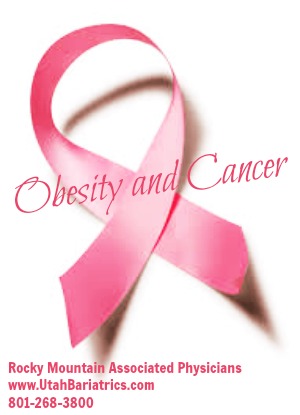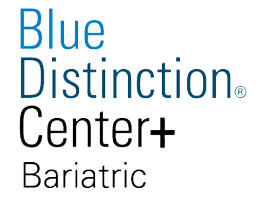Obesity and Cancer
By: Dr. Sherman C. Smith, MD, FACS
“The negative effects of obesity on good health have long been appreciated, and the list of medical conditions associated with obesity is lengthy. It is not surprising that many types of cancer seem to be associated with the problem of obesity.”
How does Obesity Affect Cancer?
Perhaps one of the most comprehensive studies of the cancer risk faced by the obese comes from the American Cancer Society.1 Nearly 900,000 men and women were enrolled cancer-free in 1982, and then they were followed for 16 years. Compared to normal weight subjects, men with a body mass index (BMI) greater than 40 were found to have a 52% increase in risk of losing life from cancer. A 62% increase in risk of death from cancer was found in women with similarly high BMI.
For both sexes, cancer deaths from esophagus, colon, rectum, liver, pancreas, and kidney were increased. Hodgkin’s lymphomas and multiple myeloma also took a toll on both men and women. Specific to men were increased deaths from prostate and stomach cancers, and specific to women, deaths from uterus, breast, and ovarian cancers were noted.
Stepping back from a border overview, the same investigators estimated that obese men accounted for 14% of all cancer deaths in males and that obese women accounted for 20% of all cancer deaths in females. Observing that only 6-8% of the population is severely obese to this degree, it is clear that obesity is at least related to an increased risk and that it may also be the cause of these cancers.
Lung Cancer and Obesity
Lung cancer is a killing disease which is directly linked to smoking. It does not appear that this disease has a link to obesity in the same way as those which are listed above. Stopping smoking after short-term use or never smoking in the first place are key to preventing the aqueous cell cancer of the lung, which rakes nearly 200,000 American and more than 700,000 Chinese lives each year.2
Nevertheless, it is to be expected that an obese patient will face greater risk undergoing a thoracotomy (a surgical procedure to remove all or part of a disease or damaged lung) than would be true for a normal weight individual.3 The technical difficulty of procedure will increase proportional to the patient’s body habitus (known as the cardiopulmonary risk index or CPRI), and this translates into greater risk. Abdominal surgery would be even more difficult if not prohibitive for other kinds of cancers in the gastrointestinal tract.
Cancer and the Esophagus
When acid from the stomach frequently washes back up into the esophagus, the condition known as reflux esophagitis can occur. This is a common problem for those who are obese, occurring more than twice as often as normal weight patients.
Not surprisingly, cancer of the esophagus is also known as an obesity-related disease probably because the chronic irritation which produces changes in the esophageal lining, known as Barrett’s esophagitis, can progress to cancer.
While recent reports of curing patients of this problem by radiofrequency ablation (image-guided technique designed to kill cancer cells by heating and destroying them) before it progresses to cancer are promising, the acid reflux must stop to prevent recurrence.4
Bariatric surgery procedures have great success in reducing weight, which will frequently relieve symptoms. Gastric Bypass is a weight loss procedure that has a clear benefit of relieving the acid reflux in the great majority of patients.5 Symptomatic relief is also noted in as many as 30% of patients with an Adjustable Gastric Band6, another type of weight loss procedure. This relief comes soon after the procedures, even before the patients lose weight. Perhaps this will translate into a lower incidence of esophageal cancer as well.
Chemotherapy
Chemotherapy for victims of breast cancer is now standard for Stage II and Stage III disease. These patients with positive lymph nodes for cancer have been reviewed with respect to factors such as obesity, diet and exercise. Obese patients with body weight as little as 20% above ideal experienced as much as 33% increase in cancer recurrence compared to those with body weight less than 20% above idea.
Long-term survival was only 40% compared to 54% on the lighter weight group.7,8 Overweight patients who exercised and are on high fruit and vegetable diets appeared to have been able to erase the adverse effect of the obesity on survival, but only small numbers of the obese were able to e active and choose food appropriately.9
Conclusion
While we should acknowledge that modern oncology practices involving surgery, chemotherapy and radiation have saved the lives of hundreds of thousands in the past decade. We should not ignore the fact that the moderately and severely obese may not be among the large numbers enjoying those benefits.
Those who have undergone weight loss surgery can tell a different story. We remain hopeful that other successful bariatric procedures will carry this same kind of highly favorable impact upon the future wellness of those who choose surgical treatment of this very difficult condition.
About the Author:

Dr. Sherman C. Smith, MD, FACS, had practiced general and bariatric surgery in Salt Lake City for the past 25 years. He was a graduate of Brigham Young University and received his Doctorate Degree at the University of Utah School of Medicine in 1972. He served in the US Army Medical Corps for eight years before beginning private practice at Rocky Mountain Associated Physicians.
References:
- EE Calle, C Rodriquez, K Walker-Thurmond, M Thun Overweight, Obesity and Mortality from Cancer in a Prospectively Studied Cohort of U.S. Adults, NEJM 348:1625-1638, April 24, 2003, No. 17
- A Jemal, R Siegel, E Ward, et.al., Cancer Statstics, 2006, CA Cancer J Clin, 2006; 56:106-110
- SK Epstein, LJ Faling, BD Daly, BR Celli, Predicting Complications after Pulmonary Resection, Chese, 1993; 104:694-700
- NJ Shaheen, P Sharma, BG Overholt, et.al., Radiofrequency Ablation in Barrett’s Esophagus with Dysplasia, NEJM, vol. 360: 2277-2288, May 28, 2009, No. 22
- SC Smith, CD Edwards, GN Goodman, Symptomatic and Clinical Improvement in Morbidly Obese Patients with Gastroesophageal Reflux Disease Following Rou-en-Y Gastric Bypass, Obesity Surgery, 7, 1997, p. 479-484
- JB Dixon, P O’Brien, Gastroesophageal Reflux in Obesity: The Effect of Lap-Band Placement, Obesity Surgery, 9, 1999, p. 527-531
- J Batarrachea, GN Hortobagvi, TL Smith, et.al.; for patients Obesity as an adverse prognostic factor for patients receiving adjuvant chemotherapy for breast cancer; Ann Int. Med 1994
- J K Litton, A M Gonzalez-Angulo, C L Warneke, et.al., Relationship Between Obesity and Pathologic Response to Neoadjuvant Chemotherapy Among Women with Operable Breast Cancer, J Clin Oncol., September 1, 2008; 26 (25): 4072-4077
- J P Pierce, M L Stefanick, S W Flatt, Greater Survival after Breast Cancer in Physically Active Women with High Vegetable-Fruit Intake Regardless of Obesity, J. Clin, Oncol., June 10, 2007; 25 (17): 2345-2351
Obesity and Cancer also appeared in OAC Your Weight Matters magazine here.
Links to similar articles:
Cancer and Obesity
www.RMAP.com
Rocky Mountain Associated Physicians
801-268-3800
1160 East 3900 South, Suite 4100
SLC, UT 84124














 Address: 1521 East 3900 South STE 100
Address: 1521 East 3900 South STE 100 Office: +
Office: +  Fax number (801) 268-3997
Fax number (801) 268-3997 Email: info@rmapinc.com
Email: info@rmapinc.com



